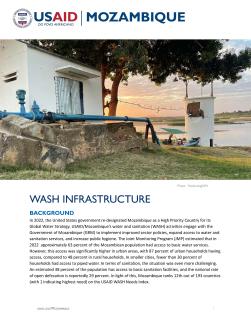BACKGROUND
In 2022, the United States government re-designated Mozambique as a High Priority Country for its Global Water Strategy. USAID/Mozambique’s water and sanitation (WASH) activities engage with the Government of Mozambique (GRM) to implement improved sector policies, expand access to water and sanitation services, and increase public hygiene. The Joint Monitoring Program (JMP) estimated that in 2022 approximately 63 percent of the Mozambican population had access to basic water services. However, this access was significantly higher in urban areas, with 87 percent of urban households having access, compared to 48 percent in rural households. In smaller cities, fewer than 30 percent of households had access to piped water. In terms of sanitation, the situation was even more challenging. An estimated 38 percent of the population has access to basic sanitation facilities, and the national rate of open defecation is reportedly 29 percent. In light of this, Mozambique ranks 12th out of 193 countries (with 1 indicating highest need) on the USAID WASH Needs Index.
PROGRAM DESCRIPTION
A&E and Oversight Services for WASH Infrastructure provides consultancy services to increase access to safe drinking water and sanitation services through the rehabilitation and/or construction of water supply systems and public sanitation facilities in 10 small towns in the provinces of Cabo Delgado, Nampula, and Zambézia.
The construction activities will be carried out by one or more construction firms under a firm-fixed-price type Task Order between USAID and the selected contractor(s).
EXPECTED RESULTS AND IMPACTS
The WASH Architecture & Engineering (A&E) contractor will serve as external overseer and advisor, furnishing independent design and construction quality verification as well as confirmation of the amount and value of work completed. The WASH Infrastructure activities contribute to the following expected results:
Increase access to equitable, safe, reliable, and affordable drinking water;
Increase access to safe, equitable access to public sanitation.
The goal of the WASH Infrastructure activity is to increase the resilience of vulnerable populations to the key shocks by increasing their access to safe water and public sanitation through climate-resilient and reliable WASH facilities.
| | |||

